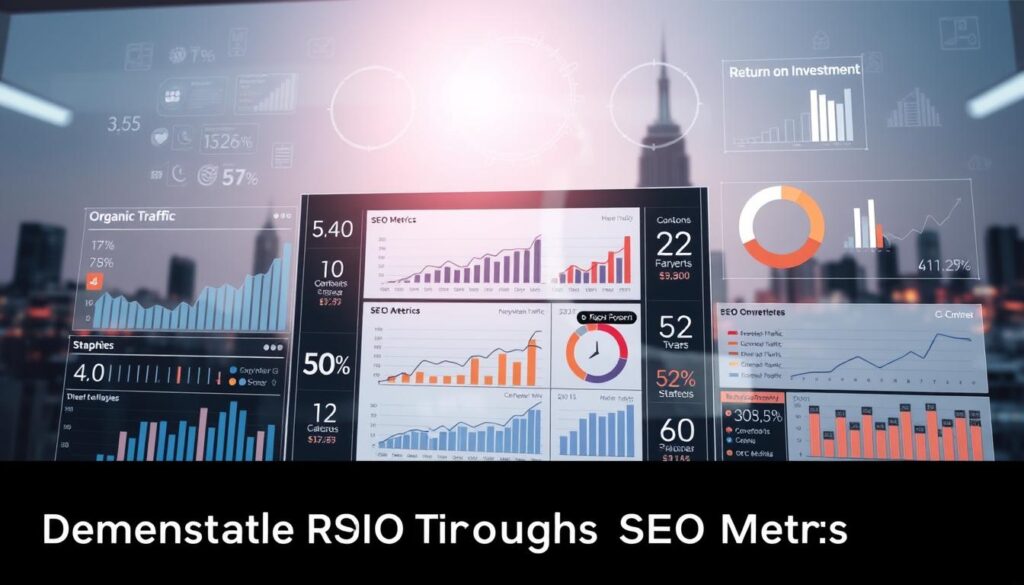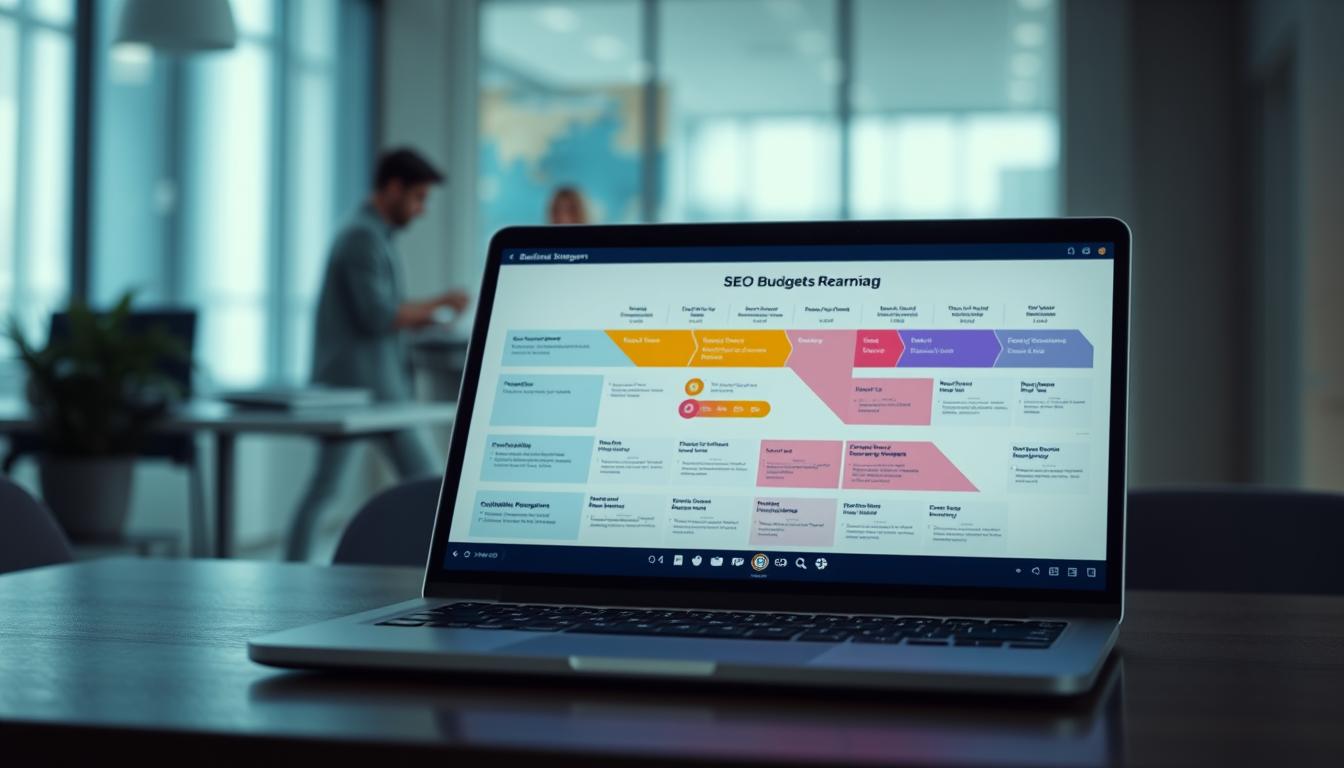Digital marketing is changing fast, and planning your SEO budget is key for growth. Crowley Media Group sees SEO as a smart investment. It boosts your online presence and drives success over time.
More companies see SEO as a valuable investment. They spend $2,500 to $7,500 a month on it. This can lead to big growth in organic traffic and new customers.
Today’s digital world needs smart planning. Top companies see SEO as a must-have for their marketing. They spend 5% to 10% of their marketing budget on it. This helps them reach their audience better online.
Key Takeaways
- SEO is a long-term investment with sustainable growth potential
- Strategic budget allocation is critical for digital marketing success
- Affordable SEO services can generate significant ROI
- Most businesses spend between $500 to $7,500 monthly on SEO
- Comprehensive SEO strategies drive organic traffic and revenue
Understanding SEO as a Business Investment
Search engine optimization is a smart way to market online. It’s different from traditional ads. SEO builds value slowly but grows over time. It helps businesses grow online without spending a lot.
Debunking SEO Myths and Misconceptions
Many companies don’t get SEO. They think it’s quick or optional. But, SEO is a smart investment that boosts a company’s online presence for the long run.
- SEO is not a one-time project but an ongoing process
- Organic search drives significant website traffic
- Strategic investments yield measurable returns
The Difference Between SEO and Traditional Marketing
Traditional marketing is often expensive and short-lived. SEO, on the other hand, aims for lasting growth. It uses keywords and improves site authority to attract valuable customers.
Long-term Value Proposition of SEO
The 70-20-10 marketing rule guides resource allocation. For SEO, this means using proven methods and trying new ones. Investing in SEO can lead to big returns as your site becomes more relevant and authoritative.
- Technical SEO audits: $500-$2,500
- Content creation: $100-$500 per piece
- SEO tools: $100-$500 monthly
Seeing SEO as a key investment helps companies build strong online strategies. These strategies drive growth and attract customers.
Current Digital Marketing Landscape and SEO’s Role
The digital marketing world is changing fast. Search engines are now key to how businesses reach their audience. Google, for example, drives 63.41% of web traffic referrals, showing how vital SEO is.
For small and medium-sized businesses, digital marketing doesn’t have to be expensive. The Gartner CMO Spend Survey shows that marketing budgets are being cut. This makes finding cost-effective digital strategies even more important.
- Organic search generates 1000% more visitors than social media
- Average organic search contributes to 53% of website traffic
- Position #1 in Google search results attracts 35.08% of clicks
SEO strategies today are more than just about keywords. With AI and large language models on the rise, businesses need to update their tactics. They can use affordable SEO methods that fit into their overall digital marketing plans.
The Search Engine Journal’s State of SEO 2024 Report shows interesting numbers. 28.56% of businesses spend $1,001-$5,000 a month on SEO. Meanwhile, 29.69% spend $1,000 or less. This proves that SEO can be affordable for any business size.
Building Your SEO Budget Framework
Creating a strategic SEO budget is key for businesses wanting to boost their online presence. Affordable search engine optimization needs careful planning and smart resource use to get the most from digital marketing.
When setting up budget SEO packages, businesses must think about several important factors. These factors affect their investment strategy:
- Current digital marketing capabilities
- Specific business goals and growth objectives
- Competitive landscape in your industry
- Available internal and external resources
Determining Initial Investment Requirements
Small to medium-sized businesses usually spend 5-10% of their marketing budget on SEO. The cost can be between $2,500 to $7,500 per month. This depends on how complex the project is and what you want to achieve.
Resource Allocation Strategies
- Use 40-50% for content and on-page SEO
- Put 30-40% into off-page SEO activities
- Save 20-30% for technical SEO improvements
Tools and Technology Considerations
Choosing the right SEO tools is vital for tracking your progress and managing your digital strategy. Look for comprehensive platforms that offer keyword research, analytics, and competitive insights. Make sure they fit your affordable search engine optimization goals.
Effective SEO is a long-term investment. Regular budgeting and strategic planning are essential. They help your business grow and stay visible online over time.
Demonstrating ROI Through SEO Metrics

Measuring a cost-efficient SEO agency’s success is more than just counting website visitors. Real value shows up when digital success translates into real business gains. By figuring out SEO return on investment (ROI), you get a clear view of your marketing’s worth.
Important metrics help businesses see how well their SEO is doing:
- Organic traffic volume
- Conversion rates
- Keyword rankings
- Revenue from organic search
Calculating ROI is easy: (SEO Revenue – SEO Costs) / SEO Costs. For example, if SEO brings in $200,000 and costs $40,000, your ROI is 400%.
Keeping track of performance needs strong tools like Google Analytics and Google Search Console. These tools watch key signs such as:
- Average session duration
- Bounce rates
- Click-through rates
- Conversion pathways
Experts say it takes 4-12 months to see big SEO wins. A good SEO agency knows this and sets fair goals. They focus on long-term plans for lasting organic growth.
Also, 49% of marketers say SEO gives the best digital marketing ROI. Organic search brings 5.3 times more returns than paid ads. So, investing in smart SEO is a smart move for forward-thinking companies.
SEO Budget Planning and Cost Analysis
Creating a smart SEO budget is all about planning and knowing your digital marketing needs. Affordable SEO doesn’t mean you have to settle for less quality. Wise businesses see that budget-friendly SEO can bring big benefits over time.
When thinking about SEO spending, aim for a flexible plan that brings the best returns. The 70-20-10 budgeting model is a great guide:
- 70% for stable, proven SEO strategies
- 20% for new, related tactics
- 10% for risky, experimental chances
Monthly vs. Project-Based Budgeting
Deciding between monthly and project budgets depends on your goals. Monthly budgets usually range from $500 to $10,000. Most spend between $1,001 and $5,000. Local SEO starts at $500, while national campaigns can cost more than $5,000.
Cost-Benefit Analysis Models
Understanding SEO investment means looking at potential gains. Key metrics to consider include:
- Expected traffic growth (3-5X increase)
- Conversion rates (1-2%)
- Potential revenue
Scalability Considerations
Good SEO budgeting grows with your business. Tech companies might spend $41,000 to $1.25 million monthly. It’s wise to spend 5-10% of your revenue on marketing, with 25-50% for SEO.
In the end, affordable SEO is a smart investment. A well-thought-out budget can greatly improve your digital marketing. It leads to lasting growth and keeps you ahead of the competition.
Aligning SEO Goals with Business Objectives

Startups need to link their SEO plans with their main business goals. This way, they can get the most out of their digital marketing spending. Good SEO is not just about ranking high. It’s about making real connections that help the business grow.
When making digital marketing plans, focus on clear, measurable goals. These goals should help the business grow. This way, every SEO dollar works hard to bring in results.
- Increase brand visibility through targeted content marketing
- Drive sales by optimizing conversion-focused landing pages
- Expand market reach with strategic keyword targeting
- Build thought leadership through high-quality, informative content
Choosing the right SEO activities can make a big difference. For example, optimizing high-traffic pages can quickly boost sales. This is better than spending a lot on big site changes.
It’s important to check how well SEO is working often. Doing this every quarter helps businesses:
- Move resources to where they work best
- Keep up with market changes
- Make sure SEO matches business goals
Seeing SEO as a key investment helps companies grow in a big way. It gives them a strong edge over the competition.
Conclusion
Creating a strong SEO budget is key to your business’s online growth. It’s not just a marketing cost. It’s a smart investment in your digital success. Companies that spend 5% to 10% of their marketing budget on SEO see big gains.
They can see up to a 260% boost in organic revenue. This shows the power of SEO in growing your business.
Affordable SEO services help you stay visible online. You might see results in 6 to 12 months. But the long-term gains are huge.
Expect more organic traffic and a stronger online presence. This gives you a competitive edge. Spending $2,500 to $7,500 a month can really change your digital game.
Ready to boost your online presence? Crowley Media Group offers top-notch SEO solutions. Visit crowleymediagroup.com or call (916) 572-9755. See how a smart SEO budget can take your business to new heights.
Don’t just spend on marketing. Invest in your digital future.








